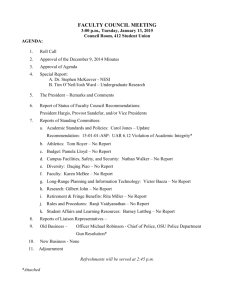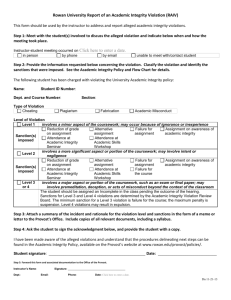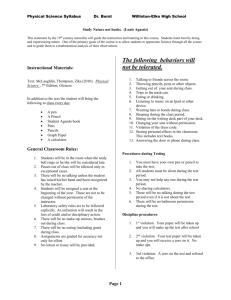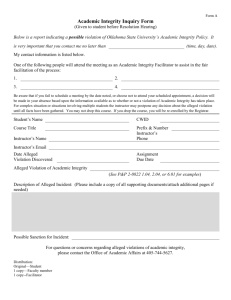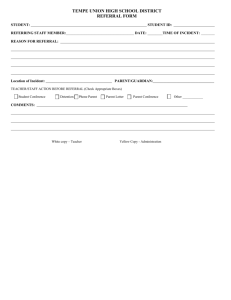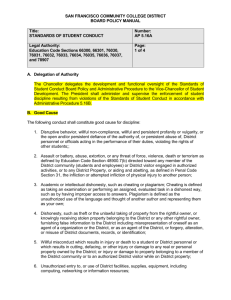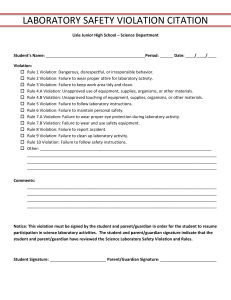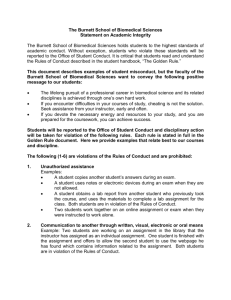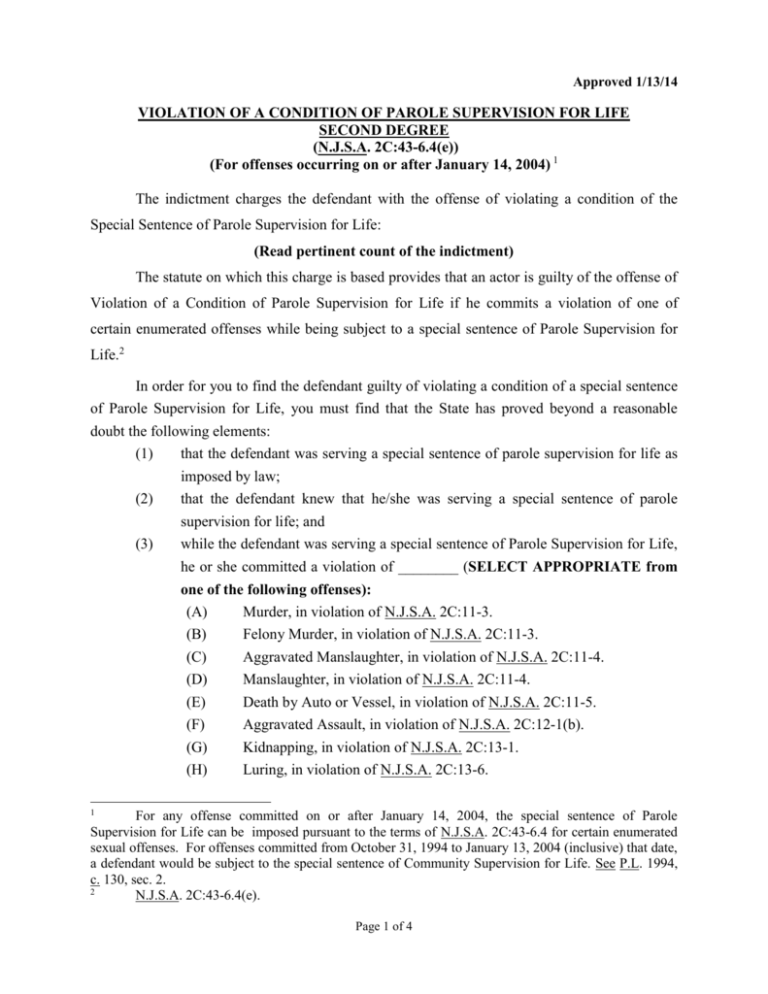
Approved 1/13/14
VIOLATION OF A CONDITION OF PAROLE SUPERVISION FOR LIFE
SECOND DEGREE
(N.J.S.A. 2C:43-6.4(e))
(For offenses occurring on or after January 14, 2004) 1
The indictment charges the defendant with the offense of violating a condition of the
Special Sentence of Parole Supervision for Life:
(Read pertinent count of the indictment)
The statute on which this charge is based provides that an actor is guilty of the offense of
Violation of a Condition of Parole Supervision for Life if he commits a violation of one of
certain enumerated offenses while being subject to a special sentence of Parole Supervision for
Life.2
In order for you to find the defendant guilty of violating a condition of a special sentence
of Parole Supervision for Life, you must find that the State has proved beyond a reasonable
doubt the following elements:
(1)
that the defendant was serving a special sentence of parole supervision for life as
imposed by law;
(2)
that the defendant knew that he/she was serving a special sentence of parole
(3)
supervision for life; and
while the defendant was serving a special sentence of Parole Supervision for Life,
he or she committed a violation of ________ (SELECT APPROPRIATE from
one of the following offenses):
(A)
Murder, in violation of N.J.S.A. 2C:11-3.
(B)
Felony Murder, in violation of N.J.S.A. 2C:11-3.
(C)
Aggravated Manslaughter, in violation of N.J.S.A. 2C:11-4.
(D)
Manslaughter, in violation of N.J.S.A. 2C:11-4.
(E)
Death by Auto or Vessel, in violation of N.J.S.A. 2C:11-5.
(F)
Aggravated Assault, in violation of N.J.S.A. 2C:12-1(b).
(G)
(H)
Kidnapping, in violation of N.J.S.A. 2C:13-1.
Luring, in violation of N.J.S.A. 2C:13-6.
1
For any offense committed on or after January 14, 2004, the special sentence of Parole
Supervision for Life can be imposed pursuant to the terms of N.J.S.A. 2C:43-6.4 for certain enumerated
sexual offenses. For offenses committed from October 31, 1994 to January 13, 2004 (inclusive) that date,
a defendant would be subject to the special sentence of Community Supervision for Life. See P.L. 1994,
c. 130, sec. 2.
2
N.J.S.A. 2C:43-6.4(e).
Page 1 of 4
VIOLATION OF A CONDITION OF PAROLE SUPERVISION FOR LIFE
SECOND DEGREE
(N.J.S.A. 2C:43-6.4(e))
(For offenses occurring on or after January 14, 2004)
(I)
(J)
(K)
(L)
(M)
Sexual Assault, in violation of N.J.S.A. 2C:14-2.
Criminal Sexual Contact, in violation of N.J.S.A. 2C:14-3.
Endangering the Welfare of a Child, in violation of N.J.S.A.
2C:24-4.
Burglary, in violation of N.J.S.A 2C:18-2, when the offense is a
crime of the second degree.3
Possession of a Firearm for an Unlawful Purpose, in violation of
N.J.S.A. 2C:39-4(a).4
The first element that the State must prove beyond a reasonable doubt is that the
defendant was serving a special sentence of Parole Supervision for Life as imposed by law.
The second element that the State must prove beyond a reasonable doubt is the defendant
knew that he/she was serving a special sentence of Parole Supervision for Life.
A person acts knowingly with respect to the nature of his/her conduct or the attendant
circumstances if he/she is aware that the conduct is of that nature or that such circumstances exist
or the person is aware of a high probability of their existence. A person acts knowingly with
respect to a result of the conduct if he/she is aware that it is practically certain that the conduct
will cause a result. “Knowing,” “with knowledge,” or equivalent terms have the same meaning.
Knowledge is a condition of the mind. It cannot be seen. It can only be determined by inference
from defendant’s conduct, words or acts. A state of mind is rarely susceptible of direct proof but
must ordinarily be inferred from the facts. Therefore, it is not necessary that the State produce
witnesses to testify that an accused said that he/she had a certain state of mind when he/she did a
particular thing. It is within your power to find that such proof has been furnished beyond a
reasonable doubt by inference which may arise from the nature of his/her acts and conduct and
from all he/she said and did at the particular time and place and from all surrounding
circumstances established by the evidence.
The third element that the State must prove beyond a reasonable doubt is that while the
defendant was serving a special sentence of Parole Supervision for Life, he/she committed a
3
4
See N.J.S.A. 2C:18-2(b).
N.J.S.A. 2C:43-6.4(b).
Page 2 of 4
VIOLATION OF A CONDITION OF PAROLE SUPERVISION FOR LIFE
SECOND DEGREE
(N.J.S.A. 2C:43-6.4(e))
(For offenses occurring on or after January 14, 2004)
violation of ________________ (Choose applicable offense from one of the following
offenses5:
(A)
Murder, in violation of N.J.S.A. 2C:11-3.
(B)
Felony Murder, in violation of N.J.S.A. 2C:11-3.
(C)
Aggravated Manslaughter, in violation of N.J.S.A. 2C:11-4.
(D)
Manslaughter, in violation of N.J.S.A. 2C:11-4.
(E)
Death by Auto or Vessel, in violation of N.J.S.A. 2C:11-5.
(F)
(G)
(H)
(I)
(J)
(K)
(L)
(M)
Aggravated Assault, in violation of N.J.S.A. 2C:12-1(b).
Kidnapping, in violation of N.J.S.A. 2C:13-1.
Luring, in violation of N.J.S.A. 2C:13-6.
Sexual Assault, in violation of N.J.S.A. 2C:14-2.
Criminal Sexual Contact, in violation of N.J.S.A. 2C:14-3.
Endangering the Welfare of a Child, in violation of N.J.S.A.
2C:24-4.
Burglary, in violation of N.J.S.A 2C:18-2, when the offense is a
crime of the second degree.6
Possession of a Firearm for an Unlawful Purpose, in violation of
N.J.S.A. 2C:39-4(a).
(CHARGE IF APPLICABLE)
A Special Sentence of Parole Supervision for Life commences immediately upon the
release of a defendant from incarceration.7
5
It may be necessary to conduct a bifurcated trial if the defendant is simultaneously charged with
a substantive offense that is being alleged to act as one of the predicate offenses that form the basis of
criminal liability under the Violation of the Special Sentence of Parole Supervision for Life statute. See
State v. Ragland, 105 N.J. 189, 193-194 (1986) (The charge of Certain Persons Previously Convicted of a
Crime Not to Possess a Weapon, N.J.S.A. 2C:39-7, to be bifurcated from any substantive weapons
possessions charge); State v. Chenique-Puey, 145 N.J. 334, 343 (1996) (Bifurcated trial ordered when
charges of contempt of a domestic-violence restraining order and an underlying criminal offense arise
from the same criminal episode).
If a bifurcated trial is appropriate, it should be conducted before the same jury and the charges
tried sequentially. See Ragland, supra, 105 N.J. at 195; Chenique-Puey, supra, 145 N.J. at 343. A unitary
trial might still be appropriate if the Violation of Parole Supervision for Life charge was being tried
alone. See State v. Brown, 180 N.J. 572 (2004).
6
See N.J.S.A. 2C:18-2(b).
7
N.J.S.A. 2C:43-6.4(d).
Page 3 of 4
VIOLATION OF A CONDITION OF PAROLE SUPERVISION FOR LIFE
SECOND DEGREE
(N.J.S.A. 2C:43-6.4(e))
(For offenses occurring on or after January 14, 2004)
(RESUMPTION OF MAIN CHARGE)
If you find that the State has failed to prove any of the elements of the offense beyond a
reasonable doubt, then you must find the defendant not guilty.
If you find that the State has proved each and every element of the offense beyond a
reasonable doubt, then you must find the defendant guilty.
Page 4 of 4

